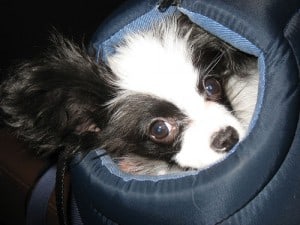From the desk of Sharda Baker.
Hi and Welcome Everyone!
This is Sharda with another Papillon newsletter!
Let’s start!
Just as exercise is important for human health and well-being, it is equally important for dogs.
All dogs require some exercise, and some breeds require considerably more exercise than others.
It is important to start your dog on a regular exercise routine to prevent obesity and other health-related problems.
Regular exercise will help your Papillon:
- Stay more alert and content
- Sleep better
- Socialize better
- Live longer
- Build strong bones and muscles
- Improve the cardiovascular system
If you have a puppy it is great to start with walks, scheduled play activities, and allowing them time to run around in a yard or other enclosed area.
Older Papillons may not self-exercise as much as a puppy, and owners will need to be more encouraging and participate more in the exercise program.
It is important to consider the energy level and exercise level needed for individual breeds. Many of the breeds of small dogs and very large dogs require limited to moderate amounts of exercise.
Mid-sized to large dogs require more exercise than either small or very large dogs. Terrier breeds, sporting breeds and working dogs are known for their love of exercise and their enthusiasm for games such as fetch and Frisbee.
Often these dogs, if kept in pairs, will play for hours with each other and get enough exercise this way.
There are several factors that influence the level of exercise that your Papillon Dog will need.
Age
Very young and very old Papillons will require special exercise to avoid exertion and strain. Try a slow walk with lots of stops for the dog or puppy to explore the area.
Avoid excessive running or rough play with either a puppy or an older dog. If you have more than one Papillon, it may be necessary to keep the older dog or the puppy away from the more active dog unless you are there to supervise.
Physical Condition
Just like humans, Papillons can become “couch potatoes”. It is important to start out slowly when exercising with your dog.
Try a short fifteen-minute walk twice a day to get started. Gradually increase the length of the walk and the pace that you are walking at.
Watch for any signs of distress in the dog such as panting, wheezing or other respiratory problems.
Be aware that dogs with short noses such as Boxers, Papillon or Bulldogs (and sometimes the Papillon) may have trouble breathing when they are exerting themselves. Try keeping the walks shorter but more frequent for these breeds.
Remember that smaller dogs have smaller legs, so a Papillon will require less walking to get the same amount of exercise that a longer legged dog will. It may be difficult to exercise a long legged and short legged dog together.
Avoid walking the dog right after eating, especially if the dog is not used to physical exercise.
An ideal walk for most Papillons is half an hour twice a day at a brisk pace. If you are in shape, and your dog is as well, you can try slow jogging with your pet, but watch out for their very short legs!
It is a great way for you both to stay in shape and spend some time together.
If your Papillon appears to have difficulty exercising, it is important to see a veterinarian. They may require a weight loss program for the dog, or perhaps a change in food.
Make sure that you check your dog’s feet for cracking or damage to the pads of the foot.
Cement, pavement, gravel or sharp stones can irritate the dog’s feet and make walking painful and unpleasant for the dog. If walking in the winter check that ice and snow is not building up between the pads.
That’s it for today.
I hope you learned something about today’s newsletter.
I’ll be back for more about papillons.
Until then!
All the best and take care.
Warmly,
Sharda Baker

